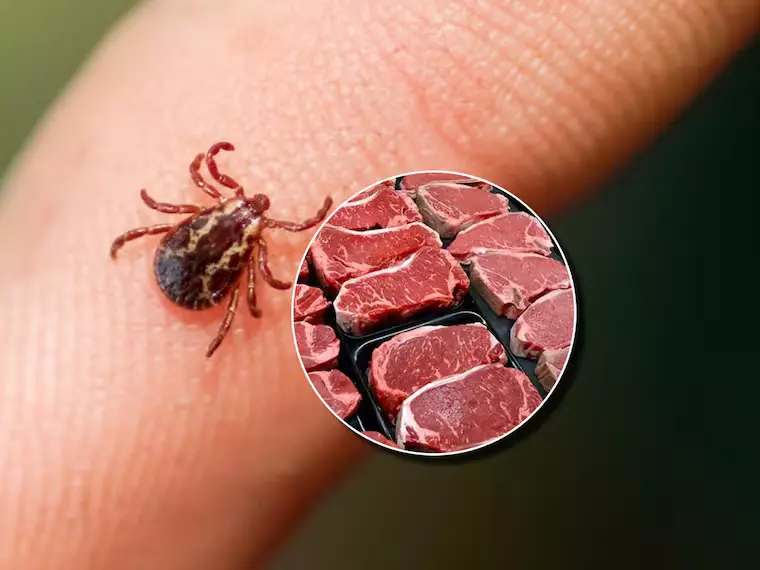A 47-year-old pilot from New Jersey was confirmed this week as the first person to die from alpha-gal syndrome. A red meat allergy linked to tick bites.
Researchers from the University of Virginia School of Medicine published their findings in a specialized journal. After months of investigating the case to determine the cause of death, with the family’s consent. Until now, the pilot’s death had been a relative mystery. Because autopsies did not indicate that he suffered from a heart problem or any other illness that could lead to such a sudden death.
The researchers managed to find the surprising link: the man ate a hamburger. A few hours later he began to feel ill, and around 7:30 p.m. he was found unconscious in a bathroom in his home, surrounded by vomit. The analysis of his death found evidence that the pilot had already begun feeling unwell a few weeks earlier. Also after eating meat, while camping with his family. At that time, he experienced diarrhea, vomiting, and stomach pain. Which he attributed to possible minor food poisoning and therefore chose not to consult a doctor.
“It’s a tragedy that they didn’t consider that it was an episode of anaphylaxis and connect it at that time to the meat consumption,” said Thomas Platts-Mills, an allergy expert at the University of Virginia. Who was part of the team that found the deceased pilot suffered from Alpha-Gal Syndrome.
Platts-Mills said he learned of the pilot’s case last February along with Erin McFeely, co-author of the new analysis. McFeely, a pediatrician, knew the deceased man’s family because their daughters attended the same ballet class. In conversations between McFeely and the man’s wife, details emerged about his previous illness. Prompting doctors to request blood tests on the pilot’s remains.
This revealed he had suffered an allergic reaction. Something the original autopsy had missed. “He had levels that are basically only seen in fatal cases of anaphylaxis,” said Platts-Mills. The blood tests showed the man had developed antibodies to a type of sugar called alpha-gal. A clear indication that a tick bite had triggered the meat allergy.
Who is most at risk?
It’s not very common for someone to die from a food allergy in the United States. According to Dr. Scott Commins, an immunologist and allergist at the University of North Carolina at Chapel Hill.
“It usually only happens in people who have underlying asthma or some other medical condition. It’s like a confluence of factors,” he said. For example, an allergic reaction can be exacerbated by alcohol consumption or exercise. As these activities increase the body’s absorption of the ingested substance. Research indicates that the New Jersey pilot consumed a beer and also exercised on the day of his death.
Another factor is when the tick bite occurred. Commins says that a recent bite could result in a more pronounced alpha-gal allergy. Conversely, if someone develops the allergy, it won’t necessarily be lifelong. In some cases, the antibody reaction may disappear within five years, according to Commins.
Alpha-gal allergy can affect anyone who engages in outdoor activities in areas where ticks are present, according to Commins. However, a tick bite alone does not necessarily require testing unless allergy symptoms are present. “When someone is bitten, it’s important to be aware of any stomach upset, itching, or hives that may develop within three to six hours of eating red meat or high-fat dairy products. such as ice cream or milkshakes,” the doctor said.
Risk from the Impacts of Global Warming
The blood of cows, deer, pigs, and goats contains alpha-gal, and when ticks feed on these mammals, the sugar remains in their saliva, which can then be transmitted to humans through subsequent bites. The human body detects alpha-gal as something foreign and unknown. A potential pathogen and therefore generates antibodies and a possible allergy.
Not everyone who is bitten by a tick develops alpha-gal síndrome. Which causes sensitivity to this sugar to the point of becoming allergic to red meat. Symptoms include nausea, stomach pain, diarrhea, or difficulty breathing. In the United States, almost all detected cases of alpha-gal syndrome are due to a specific type of tick, the star tick.
In the United States, nearly all detected cases of alpha-gal syndrome are due to a specific type of tick. The lone star tick, which thrives in the Northeast, South, and Midwest.
However, researchers at the University of Virginia have found evidence that with warmer temperaturas. Both the alpha-gal tick and its primary vector, white-tailed deer, have migrated to more areas. “That means a larger and more numerous population in the United States is being exposed to the lone star tick,” the researchers wrote in their analysis published Wednesday.
Commins warns that one obstacle to better detecting this problem is that many doctors are unfamiliar with the disease. Only 42 percent of doctors surveyed in 2023 for a Centers for Disease Control and Prevention (CDC) report said they had heard of alpha-gal síndrome. And 35 percent said they were unsure how to detect or treat the disease.
With information from Aria Bendix/NBC News/Telemundo.com
- Experts Warn About Sleep Quality When Sleeping with Your Phone - 25 de February de 2026
- Communications Sector in Holguin Rejects Blockade Against Cuba - 25 de February de 2026
- Campaign in Holguin Engages Youth Against Drug Use - 25 de February de 2026

